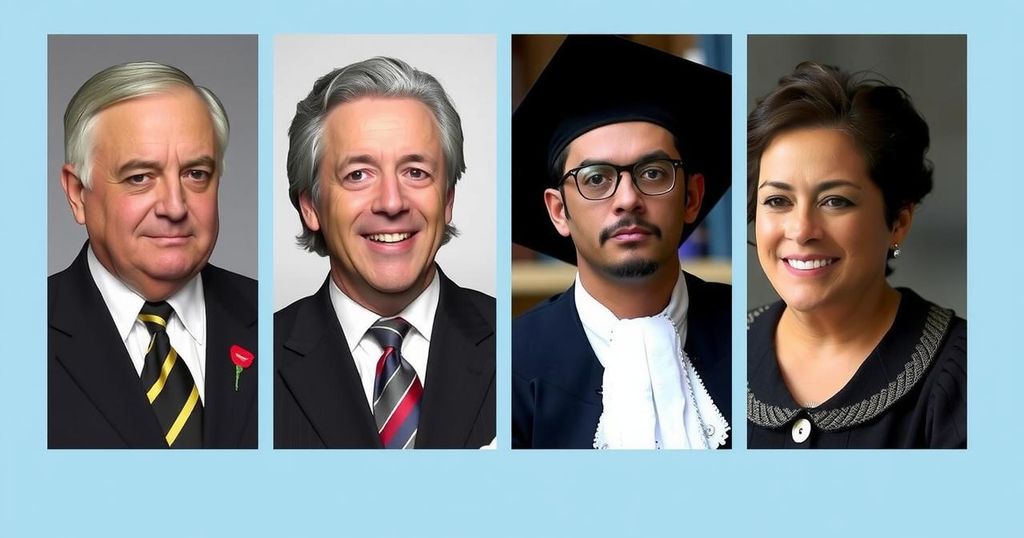Bolivia’s Judicial Elections: A Crucial Examination of Politics and Justice
Bolivia’s recent judicial elections, marked by political rivalry and public disillusionment, reveal challenges in the accountability and legitimacy of popular judicial appointments. The election reflects complexities surrounding judicial integrity in light of political influences, drawing attention from other nations like Mexico, which is considering similar reforms. Low voter turnout and controversial delays have cast a shadow over the system’s efficacy, prompting critical evaluations of its impact on democracy.
Bolivia has recently conducted a contentious popular vote to elect its top judges, which serves as a noteworthy case study for the broader Latin American region. Despite the prohibition on active campaigning, several candidates resorted to unconventional tactics, such as placing their images on snack packages, as voters grapple with an overwhelming ballot of lesser-known names. This unprecedented judicial election, unique in the world and mirrored by an impending similar process in Mexico, reflects deep-seated political power struggles, particularly between former President Evo Morales and President Luis Arce.
The origins of Bolivia’s judicial elections date back over a decade when the electoral process was established as a means to eradicate corruption and enhance democracy. However, many Bolivians perceive the elections as detrimental, exacerbating political conflicts rather than resolving them. This voting cycle, initially slated for late 2023, faced multiple delays instigated by the Constitutional Court, further intensifying political rivalries and benefitting incumbents affiliated with President Arce.
Prominent figures in the Bolivian judicial system express concerns over the evolving nature of the elections, which they argue have squandered the neutrality and integrity once attributed to judicial bodies. Observers and critics point to elections being a vehicle for entrenching ruling parties and undermining judicial independence. Notably, this year, only four out of nine seats on the Constitutional Court will be contested, raising alarms over the legitimacy of the election outcomes.
Historically, low voter turnout has marked previous judicial elections in Bolivia, with many citizens expressing frustration regarding the lack of transparency and the influence of political entities in the nomination of candidates. The elections have significant implications for the wider exercise of democracy, as evidenced by the contentious history between Morales, who left office amid upheaval, and current political dynamics influenced by the ruling party.
As Bolivia continues to navigate its complex political landscape, other nations like Mexico are closely watching the developments in La Paz with hopes of learning from its electoral outcomes. The Bolivian case illustrates the intricate relationship between judicial elections and political maneuverings, ultimately posing challenges to democratic integrity in Latin America.
The current scenario in Bolivia reflects a unique approach to judicial appointments, where top judges are elected rather than appointed—a practice absent in most nations. This method of direct election aims to engender accountability and public participation in justice, although it has become a source of significant contention and scrutiny. The shifting political alliances and the push from various leaders, including Morales and Arce, have contributed to a fraught judicial landscape, affecting public confidence in regional governance and judicial processes. As such, Bolivia’s experience provides critical insights into the challenges and ramifications of electoral systems in judiciary contexts across Latin America.
The recent judicial elections in Bolivia offer significant lessons on the intersection of politics and justice within electoral frameworks. The continuation of this system underlines deep-rooted political rivalries while simultaneously raising questions about the efficacy and legitimacy of such electoral practices. As regional dynamics evolve, the implications of Bolivia’s experience resonate widely, particularly as other nations, like Mexico, consider similar reforms in their judicial systems. Ultimately, these elections may serve as a pivotal moment for Bolivia’s democratic trajectory and judicial integrity.
Original Source: apnews.com




Post Comment